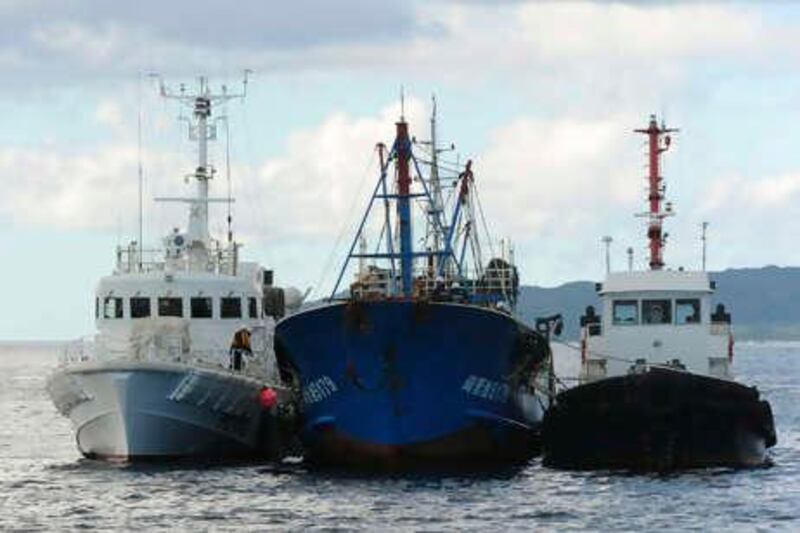BEIJING/TOKYO // Japan today freed the crew of a Chinese fishing boat detained last week in disputed waters, but held onto the captain at the centre of a territorial rift between the two neighbours. China demanded Japan release captain Zhan Qixiong after the 14 crew took a charter flight from the southern Japanese island of Ishigaki to the southeastern Chinese coastal city of Fuzhou, China's official Xinhua news agency said. The fishing boat is also on its way back to China.
A spokesman at the prosecutors' office on Ishigaki said Mr Zhan was still being held after a court approved extending his detention on Friday. Prosecutors can hold him for up to 20 days while deciding whether to take legal action after his boat collided with two Japanese coast guard ships. China's Foreign Ministry said that was not good enough. "Currently, the Japanese side continues to illegally detain the Chinese fishing boat captain, and China again strongly urges Japan to immediately release him," spokeswoman Jiang Yu said in a statement on the ministry's website (www.mfa.gov.cn).
The row over the seized fishing boat has given an emotive focus to a long-running dispute between Beijing and Tokyo over who owns a group of islets in the East China Sea, called Diaoyu in China and Senkaku in Japan. Taiwan also claims the islands. Wang Guohua, one of the released fishermen, told Xinhua that they had done nothing wrong as the Diaoyu islands were Chinese. "For generations, we have fished in those waters and so how could they seize us?" Xinhua quoted Mr Wang as saying upon his arrival back in China.
A major escalation in the dispute would not be in either Japanese or Chinese interests, said Takehiko Yamamoto, a professor at Tokyo's Waseda University. "Japan and China are two giants of the Asia-Pacific economy. It is difficult and unlikely for China to choose to link this dispute to economic issues and thus worsen bilateral trade ties," he said. "The loss would be too great for both sides." But with potentially large oil and gas reserves near the islets, the territorial dispute will remain a stubborn problem.
Chinese estimates peg reserves in the contested area of the East China Sea at nearly 17.5 trillion cubic feet of natural gas and over 20 million barrels of oil, according to US data. If these numbers are accurate, the gas reserves equal around 20 per cent of China's "proved" reserves ? reserves that can be recovered given current techniques. Activists have tried arranging their own trips to the islands to assert the competing claims.
But Taiwan authorities stopped a boat from leaving port carrying nine activists from Taiwan, Hong Kong, Macau and mainland China headed to the islands. A second Taiwan boat with two activists on board, however, later headed for the islands without interference from the authorities. Relations between Beijing and Tokyo have long been dogged by mutual distrust and Chinese bitterness over Japan's occupation of much of China before and during the Second World War.
China had summoned Japan's ambassador four times to protest the fishing boat detentions and warned Tokyo yesterday against making "misjudgements" in a case which has set back efforts to ease the distrust. Japan appeared too preoccupied with a leadership election for the ruling party to decide on how to settle the issue, said Liu Jiangyong, an expert on China-Japan relations at Tsinghua University in Beijing.
"I don't see it having a major impact on trade and economic relations. But if Japan drags this out for long after the outcome of the Democratic Party election, the repercussions could be more serious," Mr Liu said. China last week called off planned talks with Japan over an undersea gas bed dispute in another part of the East China Sea after the seizure of the fishing boat. Japan said today it would ask China to hold talks on jointly developing gas fields in the East China Sea.
"Discussions are being held based on an agreement by leaders. Seeing this as important and dealing with this calmly, we will ask China to hold talks soon to build future-oriented relations," the chief cabinet secretary Yoshito Sengoku told a news conference. * Reuters





